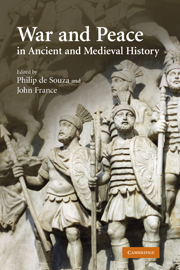Book contents
- Frontmatter
- Contents
- List of contributors
- Acknowledgements
- Note on abbreviations
- 1 Introduction
- 2 Making and breaking treaties in the Greek world
- 3 War, peace and diplomacy in Graeco-Persian relations from the sixth to the fourth century bc
- 4 Treaties, allies and the Roman conquest of Italy
- 5 Parta victoriis pax: Roman emperors as peacemakers
- 6 Treaty-making in Late Antiquity
- 7 Byzantine diplomacy: good faith, trust and co-operation in international relations in Late Antiquity
- 8 Treaties between Byzantium and the Islamic world
- 9 Siege conventions in Western Europe and the Latin East
- 10 Paying the Danegeld: Anglo-Saxon peacemaking with vikings
- 11 Peace among equals: war and treaties in twelfth-century Europe
- Bibliography
- Index
11 - Peace among equals: war and treaties in twelfth-century Europe
Published online by Cambridge University Press: 09 August 2009
- Frontmatter
- Contents
- List of contributors
- Acknowledgements
- Note on abbreviations
- 1 Introduction
- 2 Making and breaking treaties in the Greek world
- 3 War, peace and diplomacy in Graeco-Persian relations from the sixth to the fourth century bc
- 4 Treaties, allies and the Roman conquest of Italy
- 5 Parta victoriis pax: Roman emperors as peacemakers
- 6 Treaty-making in Late Antiquity
- 7 Byzantine diplomacy: good faith, trust and co-operation in international relations in Late Antiquity
- 8 Treaties between Byzantium and the Islamic world
- 9 Siege conventions in Western Europe and the Latin East
- 10 Paying the Danegeld: Anglo-Saxon peacemaking with vikings
- 11 Peace among equals: war and treaties in twelfth-century Europe
- Bibliography
- Index
Summary
The aim of this chapter is, by using a comparative approach, to shed light on a specific political development that characterised twelfth-century Western Europe, namely the consolidation of kings as leaders of their territories and people. The chapter explores the clauses of treaties to show that peace assemblies were scenarios where royal power was displayed and where kings co-operated in the attempt to control the nobility.
Not an ordinary occasion
An anthropological reading of twelfth-century treaties shows the profound universe of symbols and meanings, including the text that was issued, hidden behind the ritual and ceremonials of twelfth-century peace assemblies. These meetings gathered together two courts and other representatives such as ambassadors, Roman legates, members of the lay and ecclesiastical aristocracy, palace officials, legal advisors, notaries and scribes. The meetings were very special moments of feasting (convivia), time to ‘share bread and bed, table and roof’. The very public nature of these meetings made them a particularly suitable occasion to define social positions, prestige and power, rights and obligations. They were ideal opportunities for gestures of loyalty or grievance, of dependency or autonomy, for piety and charity. They were also the perfect time to define and agree proceedings and procedures. The political and military elements, such as an exchange of territories or castles, were only one part of the occasion, which was equally concerned with displays of friendship, trust, politeness and obligations.
- Type
- Chapter
- Information
- War and Peace in Ancient and Medieval History , pp. 193 - 210Publisher: Cambridge University PressPrint publication year: 2008
- 3
- Cited by



